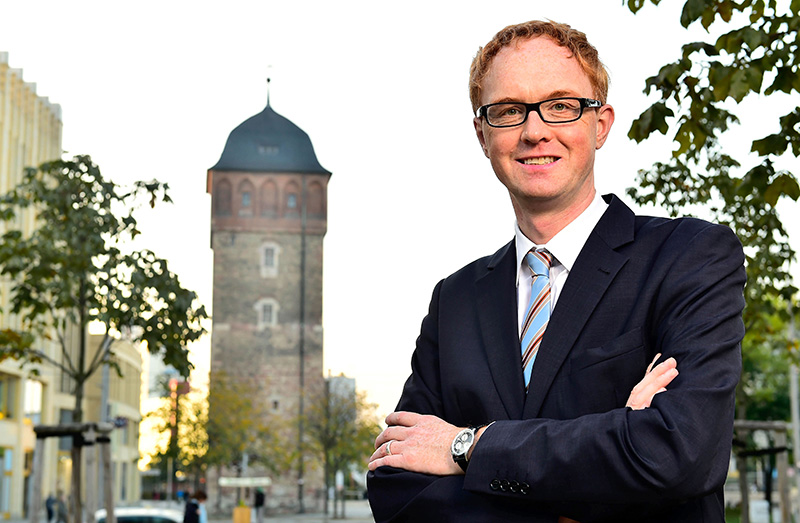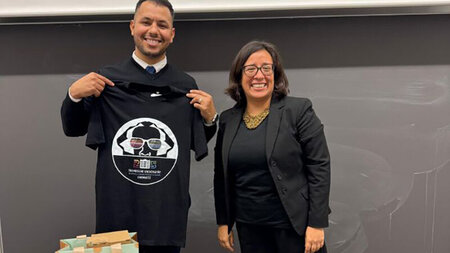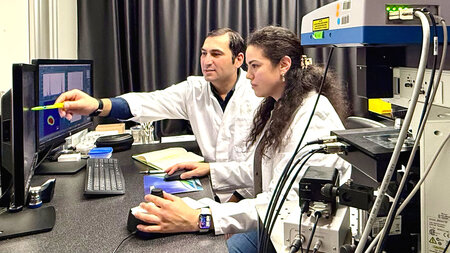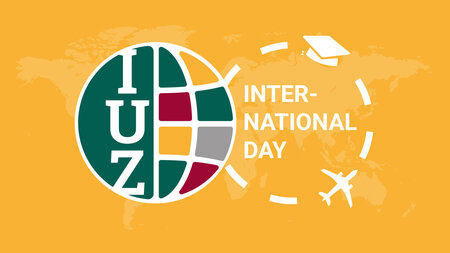The medieval history of Europe
Ten questions for Prof. Dr. Martin Clauss, Professor for Europe in the Middle Ages and the Early Modern Times since October 2014
-

On the trail of the medieval history of Chemnitz: Prof. Dr. Martin Clauss in front of the "Red Tower", which is the oldest building in the city and belonged to its fortifications. Photo: Sven Gleisberg
Prof. Dr. Martin Clauss (41) is Professor for Europe in the Middle Ages and the Early Modern Times at the Faculty of Humanities since October 2014. In ten answers he gives the readers of “University News” an insight into his career, goals and time in Chemnitz.
What do we actually understand under your area of expertise “Europe in the Middle Ages and the Early Modern Times“?
We deal with the history of Europe – that is the area from the North Cape to Constantinople, and Gibraltar to Moscow - in the Middle Ages and the Early Modern Times, i.e. the period from about 500 to 1800. I am focusing on Medieval History, i.e.the period between 500 and 1500.
TU Chemnitz is for me as a professor the right choice, because…
…here I find a very productive work environment, a dedicated department with very competent and nice colleagues as well as great students.
Could you say a few words about your academic career?
As a student and a lecturer I came to know many different universities. I have conducted research and taught at the universities in Regensburg, Berlin (Humboldt-Universität), Saarbrücken, Trier and Cologne. These experiences will enhance my work in Chemnitz.
Describe your study time in about 15 words.
Reading and asking a lot of questions. My personal highlight: - studying in Durham (UK): 4 MA-students and 8 professors!
What advice would you give young students and graduates?
Take your studies more seriously than yourself and be open for the various opportunities.
What would you like to achieve in the teaching for the future?
I want to prepare our students for the requirement of working life and help them to have fun with history, historicalsciences and their methods. Most important for us is the dealing with language and texts, right questions and creative problem solving, the ability to contextualize and deconstruct. Thus, graduates of the European History are well prepared for the changing demands in the working life.
Which impact do you make in the research at TU Chemnitz?
I would like to expand one of my previous research fields in Chemnitz – the study of the medieval war. In addition to that I am interested in the processes of reception: How are the Middle Ages perceived and interpreted in later periods? Who has what image of the Medieval period? This includes also our modern understanding of the Middle Ages, as in films, on TV, in video games or comics.
There are around 45.000 professors at German universities. What sets you apart from others?
I am 6 feet 8 inches tall and red-haired.
Which place do you show your guests the most in Chemnitz?
So far, I explore the city together with my guests and we always discover new aspects: knowledge of the historical development helps us to come to appreciate the town
How do you play a part in the life of the city?
In the future I want to work closely with local partners: This includes collaborations with schools and museums, archives and cinemas. As a medieval historian, I would like to contribute to the city’s anniversary in 2018 which, in fact, indicates the medieval origins of the city.
Further information about the professorship at: https://www.tu-chemnitz.de/phil/geschichte/gdma/
(Translation: Nataliia Boiko)
Katharina Thehos
13.11.2014




